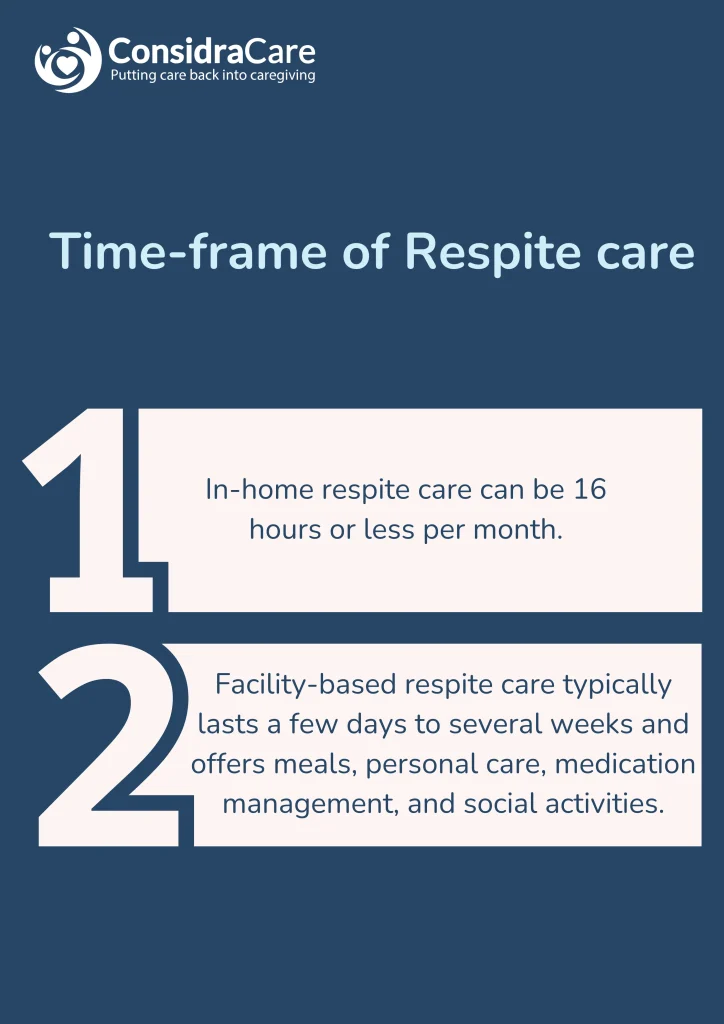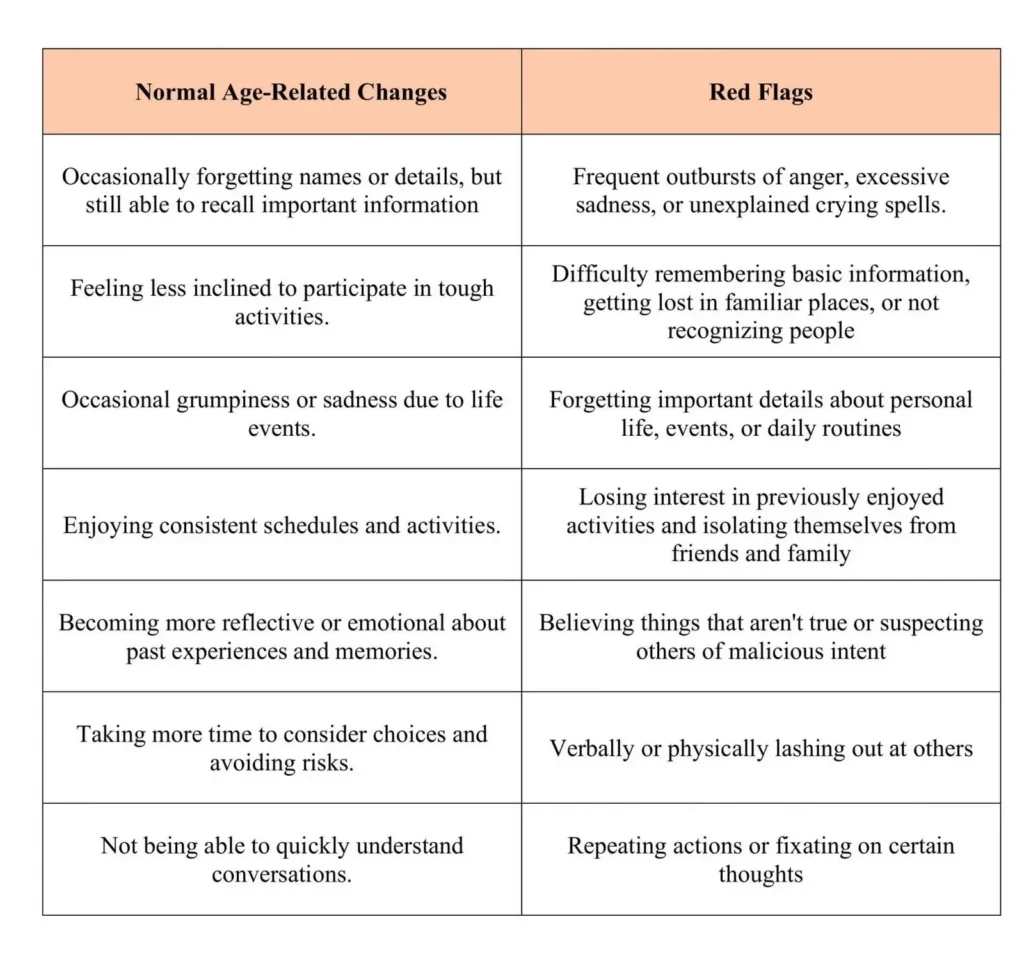To make sure your loved one is well cared for, planning for respite is important. In this article, I’ll walk you through how long respite care lasts and how you can plan for it.
How Many Hours of Respite Care Are You Allowed?
Respite care can last from a few hours to a few weeks. But the exact time duration will depend on these factors:
- Your needs
- Location
- Specific programs
As a caregiver in Toronto, you can have 4 hours of in-home respite care each week. However, if you need a longer break, some programs offer up to 3 full days of care at a residential facility each month.
In Ontario, respite care can go up to 60 hours per month if you are dealing with complex medical needs such as dementia, Alzheimer’s, cancer, or serious physical disabilities.
If you want to know the exact duration of respite, you can contact local health organizations or look up resources offering this service. They will start by asking and assessing your needs, the level of care your loved one will need, and stress levels.

Who Pays for Respite Care?
Here’s an overview of the typical costs associated with different respite care options in Ontario:

Different Funding Options to Explore:
These options can save your out-of-pocket expenses.
1. Government Programs:
The Ontario government offers different funding options to address the burden of family caregivers. The Ministry of Health and Long-Term Care provides funding through its Ontario Health at Home program. You can access these services at no cost or at an affordable rate.
2. Charitable Organizations:
If you need additional support or if you are not eligible for government programs, you can still access respite care through non-profit organizations. Organizations such as the Alzheimer Society of Canada and Easter Seals Canada aim to ease the financial strain by covering some respite care expenses.
3. Private Insurance:
Private health insurance can help cover the cost of respite care, but it’s essential to review your policy’s fine print to understand the details of coverage. If you don’t currently have insurance, take the time to explore multiple providers and compare the services and options they offer. When choosing a plan, consider important aspects like direct billing and supplementary services that may be included.
How You Can Plan for Your Respite?
If you’re planning a break from caregiving, preparing in advance can make the transition smooth for everyone involved. If you ask your family members to fill in Start by updating them about key details:
- Share information about a medical condition, such as allergies or infections, that your loved one has. Provide a current list of medications, dosages, and schedules.
- Inform them about their routine, likes, and dislikes. This can include meal preferences, favorite activities like reading or listening to music, and things to avoid that might upset them.
- Guide them about your loved ones’ critical care requirements, activities that should be encouraged, and things that must be avoided at all costs.
- Have an emergency plan on standby with important details, such as contact information for family members, healthcare providers, and nearby hospitals or emergency rooms.
How to Access Respite Care?
Emergency Respite Care:
Emergency respite care provides immediate, short-term relief for primary caregivers during unforeseen circumstances, such as sudden illness or urgent personal matters. The duration of this care is flexible, ranging from a few hours to several days or weeks, depending on individual needs and available resources.
How We Can Help You & Your Loved Ones Feel Better?
At ConsidraCare, we understand that caregiving can be both emotionally and physically exhausting, and we’re here to ease that burden for you. Whether you need support for just a few hours or round-the-clock care, we can arrange it to fit your needs.
Our team of professional and qualified caregivers provides compassionate care, treating your loved ones as if they were part of their own family. From simple household assistance to nursing and specialized services, we offer comprehensive support to make your life easier.
Contact us today to learn more about how we can help you and your loved ones.

The Takeaway:
Respite care is a valuable resource that allows you to take a break while ensuring your loved ones receive quality support. Whether its few hours of relief or a longer period, there are various options available to choose from. Most funding options make it easier for you by reducing the financial burden.
If you are thinking of taking a break, it’s important to plan in advance. This way, you can ensure the best care for your loved ones.
FAQ’s
Q. How much is respite care per hour in Ontario?
Q. What is an example of a time you need a respite?
Q. Is respite care tax deductible in Canada?
Yes, certain respite care expenses are tax-deductible in Canada as medical expenses. Eligible costs include payments for attendant care or facility-based care. You’ll need a detailed statement of services and costs, though room, board, and administrative fees are not eligible. For more details, refer to the CRA’s guidelines.
Q. Is respite care covered by OHIP?
The Ontario Health Insurance Plan (OHIP) provides coverage for several types of respite care services, including:
- In-home care: Care provided at home to give caregivers a chance to rest.
- Adult day programs: Structured programs offering social and support services for loved ones during the day.
- Short-term facility stays: Temporary stays at care facilities to relieve caregivers for a short period.
Q. How to get emergency respite care?
To arrange emergency respite care in Canada:
- Contact Local Health Authorities: Reach out to your provincial or territorial health services to inquire about available emergency respite options and potential funding.
- Private Care Providers: Explore services offered by private home care agencies or care facilities that provide short-term or emergency respite care.
- Community Organizations: Some non-profit organizations offer respite care services or can provide information on accessing emergency support.




